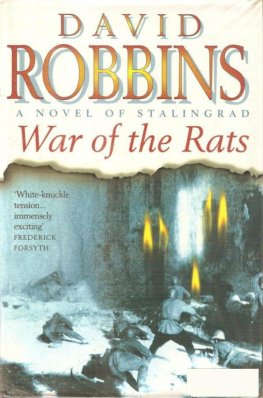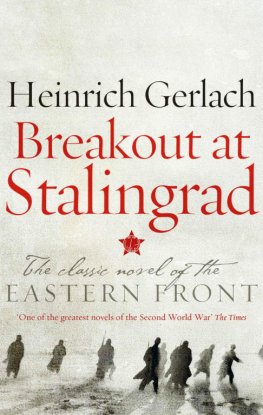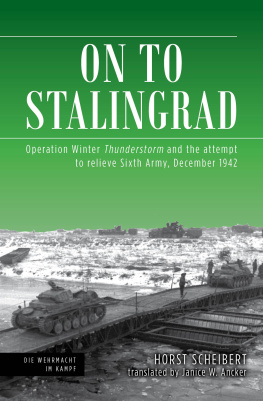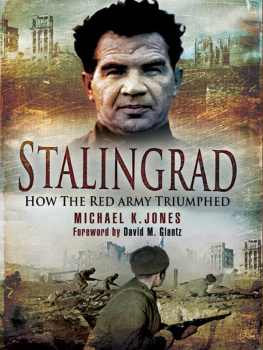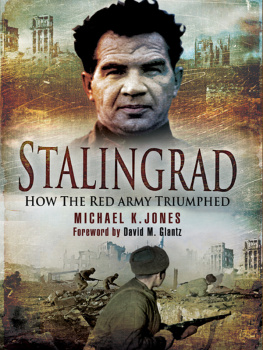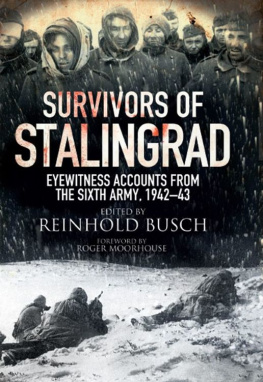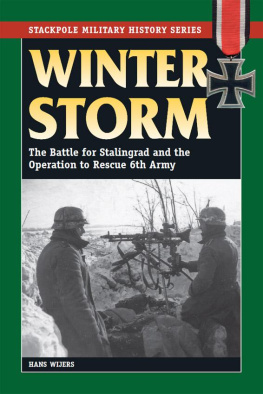STALINGRAD
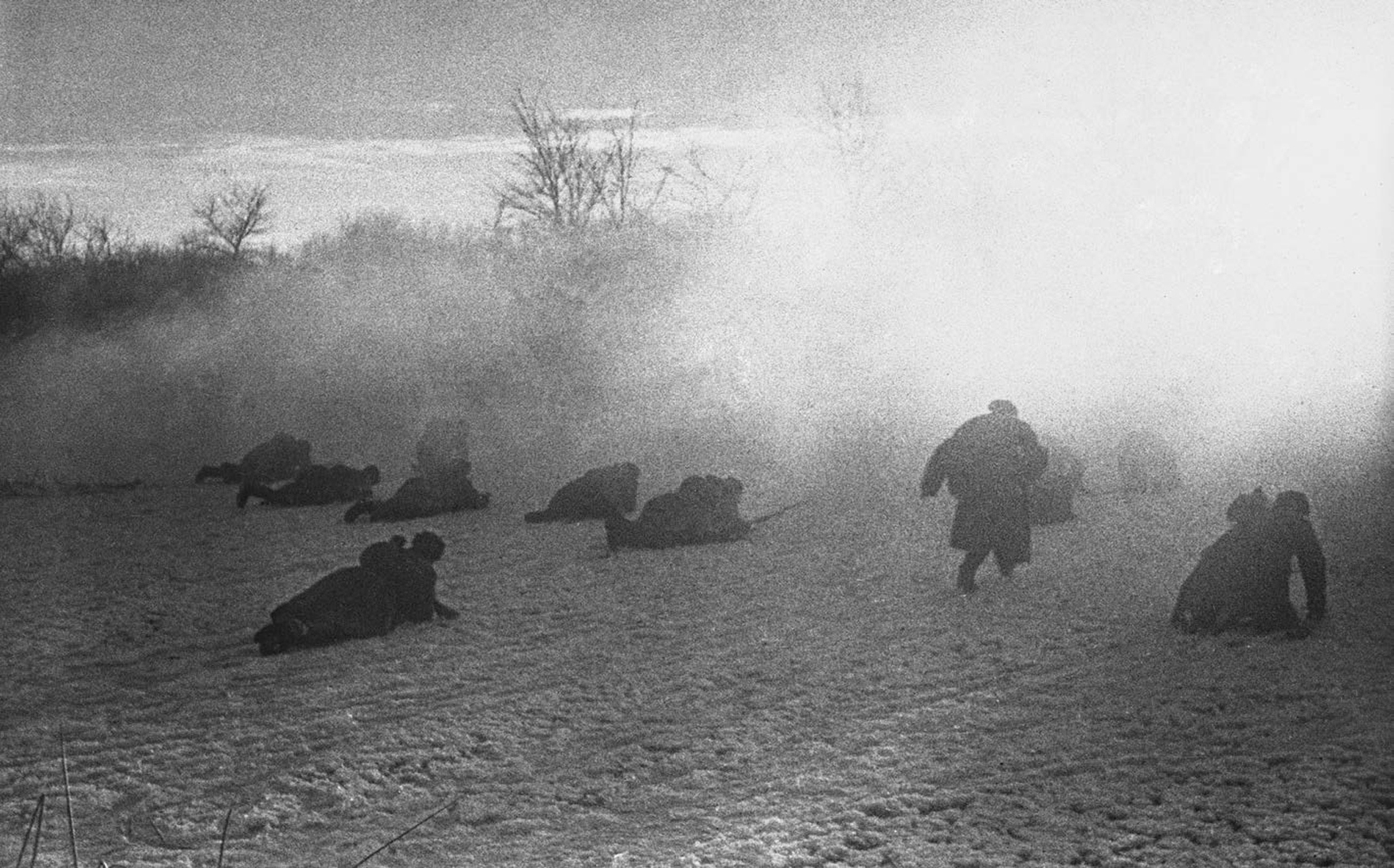
Attack. Stalingrad, 1943. Photographer: Natalya Bode


This book has been prepared as part of a joint agreement between the Institute of Russian History of the Russian Academy of Sciences and the German Historical Institute in Moscow.
Copyright 2015 by Jochen Hellbeck.
First published in Germany in 2012 by S. Fischer Verlag GmbH.
Published in the United States by PublicAffairs, a Member of the Perseus Books Group
All rights reserved.
Printed in the United States of America.
No part of this book may be reproduced in any manner whatsoever without written permission except in the case of brief quotations embodied in critical articles and reviews. For information, address PublicAffairs, 250 West 57th Street, 15th Floor, New York, NY 10107.
PublicAffairs books are available at special discounts for bulk purchases in the U.S. by corporations, institutions, and other organizations. For more information, please contact the Special Markets Department at the Perseus Books Group, 2300 Chestnut Street, Suite 200, Philadelphia, PA 19103, call (800) 810-4145, ext. 5000, or e-mail .
Book Design by Pauline Brown
Library of Congress Cataloging-in-Publication Data
Hellbeck, Jochen.
[Stalingrad-Protokolle. English]
Stalingrad : the city that defeated the Third Reich / Jochen Hellbeck.First edition.
pages cm
First published in Germany in 2012 by S. Fischer Verlag GmbHTitle page verso.
Includes bibliographical references and index.
ISBN 978-1-61039-497-0 (electronic) 1. Stalingrad, Battle of, Volgograd, Russia, 19421943. 2. Stalingrad, Battle of, Volgograd, Russia, 19421943Personal narratives, Russian. 3. Stalingrad, Battle of, Volgograd, Russia, 19421943Personal narratives, German. I. Title.
D764.3.S7H4513 2015
940.54'21747dc23
2015002880
First Edition
10 9 8 7 6 5 4 3 2 1
CONTENTS
The battle of Stalingradthe most ferocious and lethal battle in human historyended on February 2, 1943. With an estimated death toll in excess of a million, the bloodletting at Stalingrad far exceeded that of Verdun, one of the costliest battles of World War I. The analogy with Verdun was not lost on German and Soviet soldiers who fought at Stalingrad. As they described the hell of Stalingrad in their private letters, some Germans saw themselves trapped in a second Verdun. Many Soviet defenders meanwhile extolled Stalingrad, a city with a prehistory of bloody warfare, as their Red Verdun, vowing never to surrender it to the enemy. But, as a Soviet war correspondent reporting from Stalingrad in October 1942 remarked, the embattled city differed from Verdun: it had not been designed as a stronghold and it possessed
no fortresses or concrete shelters. The line of defense passes through waste grounds and courtyards where housewives used to hang out the laundry, across the tracks of the narrow gauge railway, through the house where an accountant lived with his wife, two children and aging mother, through dozens of similar houses, through the now deserted square and its mangled pavement, through the park where just this past summer lovers sat whispering to one another on green benches. A city of peace has become a city of war. The laws of warfare have placed it on the front line, at the epicenter of a battle that will shape the outcome of the entire war. In Stalingrad, the line of defense passes through the hearts of the Russian people. After sixty days of fighting the Germans now know what this means. Verdun! they scoff. This
Lasting six months, the battle also unfolded as a global media war. From the very beginning observers on all sides were fixated on the gigantic clash at the edge of Europe, heralding it a defining event of World War II. The fight for Stalingrad would become the most fateful battle of the war, a Dresden paper wrote in early August 1942, just when Hitlers soldiers were preparing their assault on the city. The British Daily Telegraph used virtually the same terms in September. In Berlin, Joseph Goebbels read the papers of Germanys enemies attentively. The battle of Stalingrad, the Nazi propaganda chief declared with a nod to the British daily, was a question of life or death, and all of our prestige, just as that of the Soviet Union, will depend on how it will end.
In November, a Soviet counterattack trapped more than 300,000 German and Axis soldiers in the Stalingrad pocket, or Kessel. German media abruptly stopped reporting on the battle and did not resume until late January 1943, when Nazi leaders realized they could not pass over the rout of an entire German army in silence. They cast the battle as one of heroic self-sacrifice, fought by German soldiers defending Europe against a superior Asian enemy. The propaganda of fear, reinforced by appeals to German citizens to embrace total war, worked imperfectly. The German security police reported that people spoke of the last bullet, which they would save for themselves once everything was over. While it would be another year and a half before the Red Army liberated the camps in Poland, the battle on the Volga disrupted the Nazi death machine. The Dresden newspaper was right, if for the wrong reasons: Stalingrad did mark a turning point in world history.

As long as the battle was raging, no foreign correspondents in Moscow were allowed to travel to Stalingrad. Secretive and distrustful, the Soviet authorities waited until February 4, 1943, before bringing in a first batch of international reportersBritish, Americans, French, Czechs, Chinese. Among them was Paul Winterton, who aired this report for the BBC:
The streets of Stalingrad, if you can give the name to open spaces between ruins, still bear all the marks of battle. Theres the usual litter of helmets and weapons, stacks of ammunition, papers flattering in the snow, pocketbooks from dead Germans, and any number of smashed corpses, lying where they fell, or stacked up in great frozen heaps for later burial. Stalingrad can never be repaired. It will have to be rebuilt from the beginning. But even though all its buildings are wrecked there is life in it still. Along the narrow stretch of cement, which the Russians held through long months of assault, there is a city of dugoutsdugouts occupied by the soldiers who have not yet left, and by a few women who stayed behind to launder and cook for the men. There is a real party atmosphere among these people today. They are the proudest men and women Ive ever seen. They know theyve done a terrific job, and theyve done it well. Their city has been destroyed, but they have smashed the invader by sheer stubbornness and unconquerable courage. These men and women fought and worked for months, with their backs to the river that they had sworn never to retreat across, facing an enemy who held the only dominating height in Stalingrad and who pounded them with shells and mortars, unceasingly by day and night. They clung to their narrow foothold, and their feet never slipped.
Winterton opened with a panoramic account of the city and the detritus of war and then moved to what interested him and other journalists
The journalists touring the battleground in February 1943 did not know that more than a month earlier, a delegation of historians from Moscow had begun a large-scale project to document for posterity the voices of the Stalingrad defenders. They belonged to the Commission on the History of the Great Patriotic War, which had been founded by Isaak Mints, a professor at Moscow State University.
Next page

